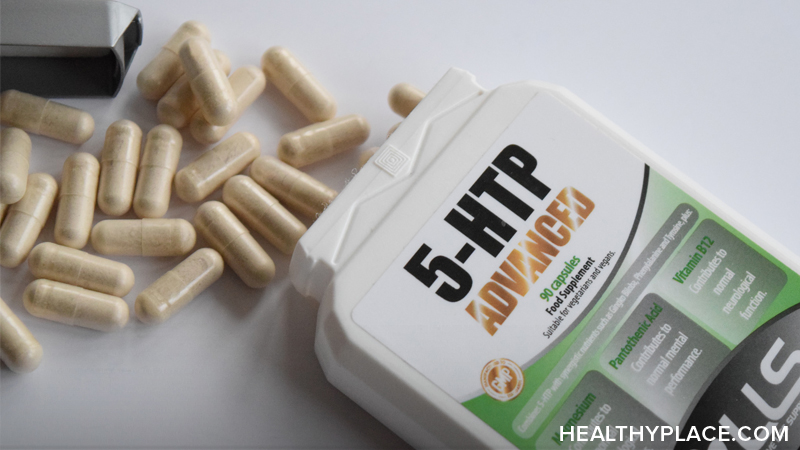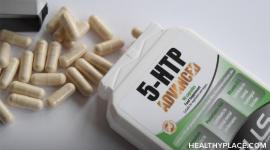5-Hydroxytryptophan (5-HTP)

Comprehensive information on 5-HTP for treating depression, insomnia and fibromyalgia. Learn about the usage, dosage, side-effects of 5-HTP.
- Overview
- Uses
- Dietary Sources
- Available Forms
- How to Take It
- Precautions
- Possible Interactions
- Supporting Research
Overview
5-hydroxytryptophan (5-HTP) is an amino acid. The body makes 5-HTP from tryptophan (an essential amino acid) and converts it to an important brain chemical known as serotonin. Tryptophan and 5-HTP dietary supplements help raise serotonin levels in the brain, which may have a positive effect on sleep, mood, anxiety, aggression, appetite, temperature, sexual behavior, and pain sensation.
It is important to note, however, that an outbreak of eosinophilic myalgia syndrome (EMS; a potentially fatal disorder that affects the skin, blood, muscles, and organs) caused by a contaminated batch of tryptophan led to the removal of all tryptophan supplements from the United States market in 1989. Although the manufacturing of 5-HTP is different from that of tryptophan, there is still concern that some 5-HTP supplements may contain similar contaminants. It is important to obtain dietary supplements from manufacturers that adhere to high quality standards. At least two organizations, NSF International and the United States Pharmacopeia (USP), offer programs that make sure manufacturers follow high quality practices. As a result, these manufacturers often indicate this information on their product labels.
Uses
5-HTP may be helpful in treating a wide variety of conditions related to low serotonin levels, including the following:
5-HTP for depression
Low levels of serotonin in the brain can contribute to the development of depression. Many drugs prescribed for depression increase serotonin levels. Some studies indicate that 5-HTP may be as effective as certain antidepressant drugs in treating individuals with mild to moderate depression. Such individuals have shown improvements in mood, anxiety, insomnia, and physical symptoms.
5 HTP for Fibromyalgia
Although many factors can influence the stiffness, pain, and fatigue associated with fibromyalgia, evidence from several studies indicates that low serotonin levels may play a role in the development of this condition. 5-HTP has been shown to improve sleep quality and reduce pain, stiffness, anxiety, and depression in individuals with fibromyalgia.
5 HTP for Insomnia
Medical research indicates that supplementation with tryptophan before bedtime can induce sleepiness and delay wake times. Studies also suggest that 5-HTP may be useful in treating insomnia associated with depression.
5 HTP for Headaches
Some studies suggest that 5-HTP may be effective in children and adults with various types of headaches including migraines.
5 HTP for Obesity
There is some evidence that low tryptophan levels may contribute to excess fat and carbohydrate intake (which can result in weight gain). A study of overweight individuals with diabetes suggests that supplementation with 5-HTP may decrease fat and carbohydrate intake by promoting a feeling of satiety (fullness). Additional similar studies of obese men and women without diabetes found that supplementation with 5-HTP resulted in decreased food intake and weight loss.
Dietary Sources for 5-HTP
5-HTP is not commonly available in food but the amino acid tryptophan, from which the body makes 5-HTP, can be found in turkey, chicken, milk, potatoes, pumpkin, sunflower seeds, turnip and collard greens, and seaweed.
Available Forms
5-HTP can be obtained in the diet (from the conversion of tryptophan) or in supplement form. 5-HTP supplements are made from extracts of the seeds of the African tree Griffonia simplicifolia. 5-HTP can also be found in a variety of multivitamin and herbal preparations.
How to Take 5-HTP
Pediatric
There are no known scientific reports on the pediatric use of 5-HTP. Therefore, it is not currently recommended for children.
Adult
50 mg of 5-HTP taken one, two, or three times per day is generally recommended for most of the conditions discussed in the Uses section.
Precautions
Because of the potential for side effects and interactions with medications, dietary supplements should be taken only under the supervision of a knowledgeable healthcare provider.
As mentioned previously, tryptophan use has been associated with the development of serious conditions such as liver and brain toxicity, and with eosinophilic myalgia syndrome (EMS), a potentially fatal disorder that affects the skin, blood, muscles, and organs. Such reports prompted the FDA to ban the sale of all tryptophan supplements in 1989. As with tryptophan, EMS has been reported in 10 people taking 5-HTP.
5-HTP may cause mild gastrointestinal disturbances including nausea, heartburn, flatulence, feelings of fullness, and rumbling sensations in some people. Pregnant or nursing women and individuals with high blood pressure or diabetes should consult a healthcare practitioner before taking 5-HTP.
In addition, as described in the Interactions section below, 5-HTP should not be taken at the same time as antidepressants.
Possible Interactions
If you are currently being treated with any of the following medications, you should not use 5-HTP without first talking to your healthcare provider.
5-HTP and antidepressant medications
Individuals taking the antidepressant medications known as selective serotonin reuptake inhibitors (SSRIs) (such as fluoxetine, paroxetine, sertraline, and citalopram) and monoamine oxidase inhibitors (MAOIs) (such as phenelzine, isocarboxazid, selegiline, and tranylcypromine) should not use 5-HTP as these medications enhance the action of these drugs and may increase the risk for developing a dangerous condition known as "serotonin syndrome." Serotonin syndrome is characterized by mental status changes, rigidity, hot flashes, rapidly fluctuating blood pressure and heart rate, and possibly coma. Similarly, other drugs for depression that interfere with the uptake of the neurotransmitter serotonin, namely trazodone and venlafexine, may also lead to serotonin syndrome when used along with 5-HTP.
5-HTP and Carbidopa
Taking 5-HTP with carbidopa, a medication used to treat Parkinson's disease, has been associated with side effects including scleroderma-like illnesses (a condition in which the skin becomes hard, thick, and inflamed).
5-HTP and Sumatriptan
Similar to antidepressants, sumatriptan, a medication used for migraine headaches that works by stimulating serotonin receptors in the brain, should also not be used in combination with 5-HTP because of the risk for serotonin syndrome.
5-HTP and Tramadol
Tramadol, used for pain control, may also increase serotonin levels too much if taken in combination with 5-HTP. Serotoninsyndrome has been reported in some people taking the two together.
5-HTP and Zolpidem
Use of zolpidem, a medication for insomnia, can cause hallucinations when used with SSRI antidepressants. Because 5-HTP may work similarly to SSRIs, the combination of 5-HTP with zolpidem could, theoretically, lead to hallucinations as well.
back to: Supplement-Vitamins Homepage
Supporting Research
Angst J, Woggon B, Schoepf J. The treatment of depression with L-5-hydroxytryptophan versus imipramine. Results of two open and one double-blind study. Arch Psychiatr Nervenkr. 1977;224:175 - 186.
Attele AS, Xie JT, Yuan CS. Treatment of insomnia: an alternative approach.Altern Med Rev. 2000;5(3):249-259.
Bhatara VS, Magnus RD, Paul KL, et al. Serotonin syndrome induced by venlafaxine and fluoxetine: a case study in polypharmacy and potential pharmacodynamic and pharmacokinetic mechansims. Ann Pharmacother. 1998;32(4):432-436.
Birdsall TC. 5-Hydroxytryptophan: a clinically-effective serotonin precursor. Altern Med Rev. 1998;3:271 - 280.
Bodner RA, Lynch T, Lewis L, Kahn D. Serotonin syndrome. Neurol. 1995;45(2):219-223.
Byerley WF, et al. 5-Hydroxytryptophan: a review of its antidepressant efficacy and adverse effects. J Clin Psychopharmacol. 1987;7:127 - 137.
Cangiano C, et al. Effects of oral 5-hydroxy-tryptophan on energy intake and macronutrient selection in non-insulin dependent diabetic patients. Int J Obes Relat Metab Disord. 1998; 22:648 - 654.
Cangiano C, Ceci F, Cascino A, et al. Eating behavior and adherence to dietary prescriptions in obese adult subjects treated with 5-hydroxytryptophan. J Clin Nutr. 1992;56:863 - 867.
Caruso I, Sarzi Puttini P, Cazzola M, et al. Double-blind study of 5-hydroxytryptophan versus placebo in the treatment of primary fibromyalgia syndrome. J Int Med Res. 1990;18:201 - 209.
Cauffield JS, Forbes HJ. Dietary supplements used in the treatment of depression, anxiety, and sleep disorders. Lippincotts Prim Care Pract. 1999; 3(3):290-304.
Ceci F, Cangiano C, Cairella M, Cascino A, et al. The effects of oral 5-hydroxytryptophan administration on feeding behavior in obese adult female subjects. J Neural Transm. 1989;76:109 - 117.
DeBenedittis G, Massei R. Serotonin precursors in chronic primary headache. A double-blind cross-over study with L-5-hydroxytryptophan vs. placebo. J Neurosurg Sci. 1985; 29:239 - 248.
DeGiorgis G, et al. Headache in association with sleep disorders in children: a psychodiagnostic evaluation and controlled clinical studyà ¢Ã¢â€š ¬Ã¢â‚¬ L-5-HTP versus placebo. Drugs Exp Clin Res. 1987;13:425 - 433.
Diamond S, Pepper BJ, Diamond MI, et al. Serotonin syndrome induced by transitioning from phenelzine to venlafaxine: four patient reports. Neurol. 1998;51(1):274-276.
Elko CJ, Burgess JL, Robertson WO. Zolpidem-associated hallucinations and serotonin reuptake inhibition: a possible interaction. J Toxicol Clin Toxicol. 1998;36(3):195-203.
FDA Talk Paper. Impurities confirmed in dietary supplement 5-hydroxy-L-tryptophan. 1998. Accessed at http://vm.cfsan.fda.gov/~lrd/tp5htp.html on February 2, 2001.
Gardner DM, Lynd LD. Sumatriptan contraindications and the serotonin syndrome. Ann Pharmacother. 1998;32(1):33-38.
George TP, Godleski LS. Possible serotonin syndrome with trazodone addition to fluoxetine. Biol Psychiatry. 1996;39(5):384-385.
Hernandez AF, Montero MN, Pla A, Villanueva E, et al. Fatal moclobemide overdose or death caused by serotonin syndrome? J Forensic Sci. 1995;40(1):128-130.
Hines Burnham T, et al, eds. Drug Facts and Comparisons 2000. 55th ed. St. Louis, MO: Facts and Comparisons; 2000.
Joffe RT, Sokolov ST. Co-administration of fluoxetine and sumatriptan: the Canadian experience. Acta Psychiatr Scand. 1997;95(6):551-552.
Joly P, Lampert A, Thomine E, Lauret P. Development of pseudobullous morphea and sclero-derma-like illness during therapy with L-5-hydroxytryptophan and carbidopa. J Am Acad Dermatol. 1991;25(2):332-333.
Juhl JH. Primary fibromyalgia syndrome and 5-hydroxy-L-tryptophan: a 90-day open study. Altern Med Rev. 1998;3:367 - 375.
Magnussen I, Nielson-Kudsk F. Bioavailability and related pharmacokinetics in man of orally administered L-5-hydroxytryptophan in steady state. Acta Pharmacol et Toxicol. 1980;46:257 - 262.
Martin TG. Serotonin syndrome. Ann Emerg Med. 1996;28:520 - 526.
Mason BJ, Blackburn KH. Possible serotonin syndrome associated with tramadol and sertraline coadministration. Ann Pharmacother. 1997;31(2):175-177.
Meyers S. Use of neurotransmitter precursors for treatment of depression. Altern Med Rev. 2000;5(1):64-71.
Murray MT, Pizzorno JE. Bromelain. In: Pizzorno JE, Murray MT, eds. Textbook of Natural Medicine. Vol 1. 2nd ed. Edinburgh: Churchill Livingstone; 1999:783-794.
Nicolodi M, Sicuteri F. Fibromyalgia and migraine, two faces of the same mechanism. Serotonin as the common clue for pathogenesis and therapy. Adv Exp Med Biol. 1996;398:373 - 379.
Nisijima K, Shimizu M, Abe T, Ishijuro T. A case of serotonin syndrome induced by concomitant treatment with low-dose trazodone and amitriptyline and lithium. Int Clin Psychopharmacol. 1996;11(4):289-290.
Perry NK. Venlafaxine-induced serotonin syndrome with relapse following amitripyline. Postgrad Med J. 2000;76(894):254.
Puttini PS, Caruso I. Primary fibromyalgia and 5-hydroxy-L-tryptophan: a 90-day open study. J Int Med Res. 1992;20:182 - 189.
Reeves RR, Bullen JA. Serotonin syndrome produced by paroxetine and low-dose trazodone. Psychosom. 1995 Mar-Apr;36(2):159-160.
Reibring L, Agren H, Hartvig P, et al. Uptake and utilization of [beta-11c] 5-hydroxytryptophan (5-HTP) in human brain studied by positron emission tomography. Pyschiatry Research. 1992;45:215 - 225.
Shils ME, Olson JA, Shike M, eds. Modern Nutrition in Health and Disease. 9th ed. Media, Pa: Williams & Wilkins; 1999.
Spiller HA, Gorman SE, Villalobos D, et al. Prospective multicenter evaluation of tramadol exposure. J Toxicol Clin Toxicol. 1997;35(4):361-364.
Sternberg EM, Van Woert MH, Young SN, et al. Development of a scleroderma-like illness during therapy with L-5-hydroxytryptophan and carbidopa. New Eng J Med. 1980;303:782-787.
Toner LC, Tsambiras BM, Catalano G, et al. Central nervous system side effects associated with zolpidem treatment. Clin Neuropharmacol. 2000;23(1):54-58.
Van Hiele LJ. L-5-hydroxytryptophan in depression: the first substitution therapy in psychiatry? Neuropsychobiology. 1980; 6:230 - 240.
Van Praag HM. Management of depression with serotonin precursors. Biol Psychiatry. 1981;16:291 - 310.
Zmilacher K, et al. L-5-hydroxytryptophan alone and in combination with a peripheral decarboxylase inhibitor in the treatment of depression. Neuropsychobiology. 1988;20:28 - 33.
back to: Supplement-Vitamins Homepage
APA Reference
Staff, H.
(2008, December 24). 5-Hydroxytryptophan (5-HTP), HealthyPlace. Retrieved
on 2026, January 14 from https://www.healthyplace.com/alternative-mental-health/supplements-vitamins/5-hydroxytryptophan-5-htp



